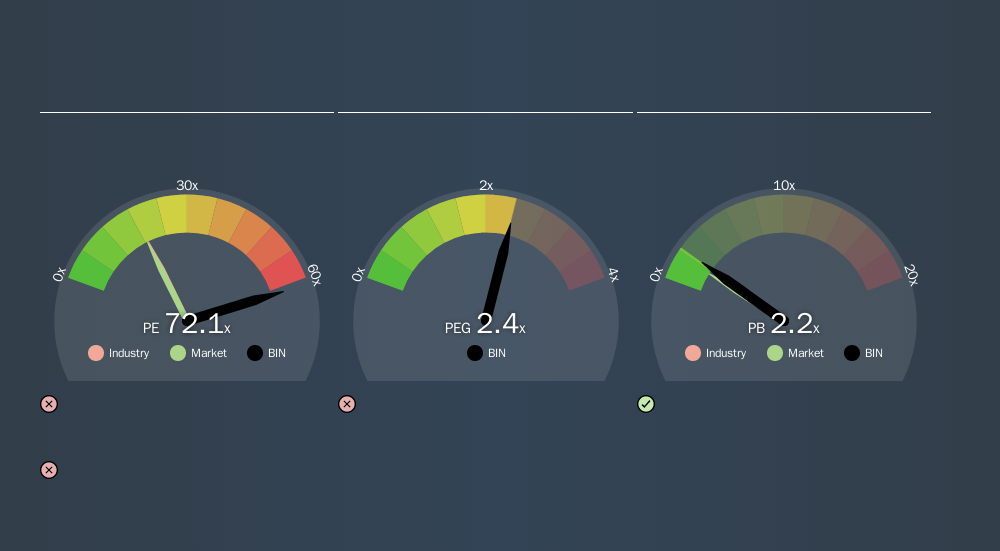How Does Bingo Industries's (ASX:BIN) P/E Compare To Its Industry, After Its Big Share Price Gain?

Bingo Industries (ASX:BIN) shares have had a really impressive month, gaining 31%, after some slippage. And the full year gain of 21% isn't too shabby, either!
All else being equal, a sharp share price increase should make a stock less attractive to potential investors. In the long term, share prices tend to follow earnings per share, but in the short term prices bounce around in response to short term factors (which are not always obvious). The implication here is that deep value investors might steer clear when expectations of a company are too high. One way to gauge market expectations of a stock is to look at its Price to Earnings Ratio (PE Ratio). Investors have optimistic expectations of companies with higher P/E ratios, compared to companies with lower P/E ratios.
See our latest analysis for Bingo Industries
Does Bingo Industries Have A Relatively High Or Low P/E For Its Industry?
Bingo Industries's P/E of 72.14 indicates some degree of optimism towards the stock. The image below shows that Bingo Industries has a significantly higher P/E than the average (18.9) P/E for companies in the commercial services industry.

Its relatively high P/E ratio indicates that Bingo Industries shareholders think it will perform better than other companies in its industry classification.
How Growth Rates Impact P/E Ratios
If earnings fall then in the future the 'E' will be lower. That means even if the current P/E is low, it will increase over time if the share price stays flat. So while a stock may look cheap based on past earnings, it could be expensive based on future earnings.
Bingo Industries shrunk earnings per share by 61% over the last year. And EPS is down 4.9% a year, over the last 3 years. This growth rate might warrant a low P/E ratio. The company could impress by growing EPS, in the future. Further research into factors such as insider buying and selling, could help you form your own view on whether that is likely.
Don't Forget: The P/E Does Not Account For Debt or Bank Deposits
Don't forget that the P/E ratio considers market capitalization. So it won't reflect the advantage of cash, or disadvantage of debt. In theory, a company can lower its future P/E ratio by using cash or debt to invest in growth.
Such expenditure might be good or bad, in the long term, but the point here is that the balance sheet is not reflected by this ratio.
Bingo Industries's Balance Sheet
Bingo Industries has net debt worth 14% of its market capitalization. That's enough debt to impact the P/E ratio a little; so keep it in mind if you're comparing it to companies without debt.
The Verdict On Bingo Industries's P/E Ratio
Bingo Industries's P/E is 72.1 which suggests the market is more focussed on the future opportunity rather than the current level of earnings. With a bit of debt, but a lack of recent growth, it's safe to say the market is expecting improved profit performance from the company, in the next few years. What is very clear is that the market has become significantly more optimistic about Bingo Industries over the last month, with the P/E ratio rising from 55.1 back then to 72.1 today. For those who prefer to invest with the flow of momentum, that might mean it's time to put the stock on a watchlist, or research it. But the contrarian may see it as a missed opportunity.
Investors should be looking to buy stocks that the market is wrong about. As value investor Benjamin Graham famously said, 'In the short run, the market is a voting machine but in the long run, it is a weighing machine. So this free report on the analyst consensus forecasts could help you make a master move on this stock.
You might be able to find a better buy than Bingo Industries. If you want a selection of possible winners, check out this free list of interesting companies that trade on a P/E below 20 (but have proven they can grow earnings).
We aim to bring you long-term focused research analysis driven by fundamental data. Note that our analysis may not factor in the latest price-sensitive company announcements or qualitative material.
If you spot an error that warrants correction, please contact the editor at editorial-team@simplywallst.com. This article by Simply Wall St is general in nature. It does not constitute a recommendation to buy or sell any stock, and does not take account of your objectives, or your financial situation. Simply Wall St has no position in the stocks mentioned. Thank you for reading.
Market Insights
Community Narratives



